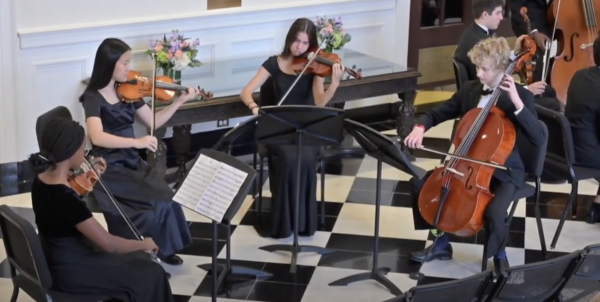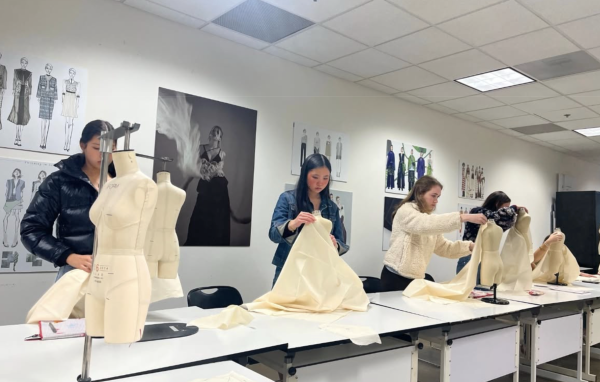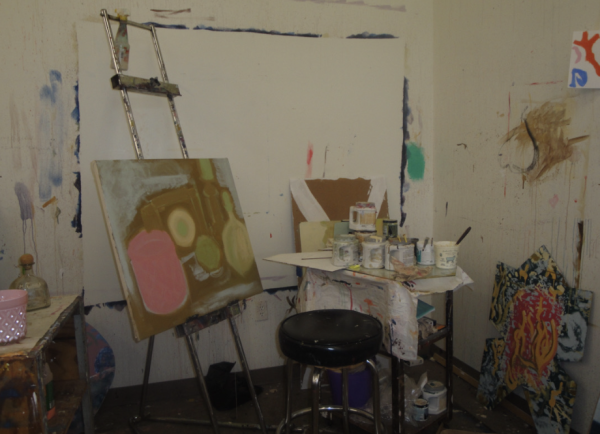Arts supplements add to college application process
As college deadlines are approaching, seniors are scrambling to put the finishing touches on their applications. One of the most important features for those who are artistically talented is the arts supplement offered by many colleges. The arts supplement serves as another medium for students to enhance their application and stand out from other applicants, whether it is demonstrating mastery of an instrument, visual art, drama, or singing, just to name a few areas.
Although the numerous categories fall under this one opportunity, each type of arts supplement possesses different criteria and requires different components. For most vocal submissions, at least two pieces are required, though this may vary depending on the school and type of program.
“A bunch of us met in the chorus room while everyone else was taking the PSAT,” said senior Juliana Freschi. “We set up a bunch of WCAT’s recording equipment, and sang songs for a couple hours.”
Freschi recorded two songs: her Messiah solo from the previous year and a German piece prepared specifically for the supplement. Some students only had to sing a few measures of various songs, while others had to record three to four full-length songs, displaying their varying skills even within one category.
Senior Mia Pattillo is submitting a repertoire of piano performances. She noted the difference when applying to a college’s music school as opposed to a college with just a music department. For music schools, a extensive repertoire usually consisting of a Bach prelude and fugue, a full classical sonata, a romantic or impressionistic piece, a 20th century piece, and a virtuosic etude is required. The less rigorous requirements for colleges with music departments include only two to three pieces.
“Once I learned all my pieces and practiced them, I just had to record with my teacher and upload them,” said Pattillo. “I also had to write a resume and repertoire list, and get my piano teacher to write a recommendation.”
As for students gifted in theatric arts, senior Alex Gist talked about the relatively simple process, which mainly calls for memorizing lines. For some, an hour of memorizing in front of mirror may be sufficient in allowing the development of natural facial expressions and gestures.
“For me personally, I spent a two and a half hour plane ride practicing two of my monologues,” said Gist. “The third one took slightly longer as it’s a large monologue.”
Senior Hannah Namnoum is taking an extra step to submit both visual art and film material as she wants to pursue film in the future. Her preparation, therefore, involves a longer process.
“It commonly consists of submitting a portfolio that showcases your best art work, and a few extra essays or writing supplements,” said Namnoum. “I’m applying to film programs so I have to prepare a film reel, a few short films, and some essays about things like inspiring movies, directors, shows, or why I wish to pursue this specific career.”
Completing an arts supplement cannot be a last-minute decision, as it requires planning and thorough preparation.
“I have been working with my private vocal coach for a few months now,” said senior Sarah Lock, who is applying to music schools as a vocal major. “After selecting my pieces, I would sight read them. We would work on pronunciation of the text since most of the pieces are in different languages.”
The choice to submit an arts supplement also means making another commitment and putting forth extra effort as compared to other students. With the supplement process comes challenges.
“Usually I focus on two to three pieces at a time, but it’s difficult when I have so many now that I have to practice all the time and keep in good shape,” said Pattillo. “A major challenge is finding a time to record; it’s been really hard to find a few hours that my teacher, myself, and the hall I record in are all available.”
Lock has experienced similar musical challenges when mastering vocal pieces.
“After I had learned the music,” said Lock, “the hardest part was perfecting the phrasing, dynamics, and expression of the pieces.”
Despite these different challenges, students chose to commit time and energy to the supplements, demonstrating their dedication to the arts. Various reasons have spurred students to submit a supplement.
“There is no ‘level’ that is required to submit one,” said Gist. “I’ve only got one play to my name but I’m still submitting one.”
Potential benefits and advantages in the college admission process were significant factors in the decision. For most, however, the most important reason was their desire to communicate to colleges their passion for a certain art.
“I figured that because singing is such an important part of my life, colleges wouldn’t know the real me if they didn’t hear my singing,” said Freschi. “For me, arts supplements were just a good way to create a more complete profile for schools.”
Pattillo, who is applying to be a music major at many schools, is still submitting arts supplements to colleges where she would not major in music to convey her passion for piano.
“Piano is something I’m passionate about,” said Pattillo. “I’ve put a lot of effort towards it throughout my life and supplements are a good way to show that.”
Throughout the process of preparation, students have received assistance. For many, that includes teachers and advisors in school and outside of school, as well as parents.
“Mr. Dauterman was so, so helpful to me while I was learning the piece,” said Freschi. “He sent me recordings of himself speaking the German words, so that I could get the pronunciation right, and instrumental versions of the song, so that I could practice singing along. He’s awesome.”
Pattillo also appreciates her long-time piano teacher outside of school, who has helped her grow throughout her musical pursuit.
“I am so grateful because my piano teacher has taken so much extra time beyond lessons to help me record and perfect my pieces,” said Pattillo. “She also wrote a really bomb recommendation for me. She is the best.”
Teachers can be a great influence in the beginning of the process as well. Gist had not been preparing to submit a supplement until a recent encounter.
“I was convinced by Mrs. Morgens at this year’s college fair to submit a theatre art supplement along with my applications,” said Gist.
Besides teachers, parents have been supportive of their children throughout the challenging admissions process, trying to provide assistance where needed.
“My mom has helped a lot,” said Namnoum. “From researching the schools with me to printing out each different requirement from each art supplement and colored coding it. Now, I’m able to feel organized and in control during this time of high stress.”
Visual arts department chair Benjamin Steele, who has aided students in visual arts, believes there can be benefit to submitting an arts supplement. A range of styles and media, and overall the students’ best quality work are key to helping them stand out.
“I think that an arts supplement can give an indication of a students ability,” said Steele. “But I am in favor of students submitting a whole portfolio when that is possible. This will show more.”
Steele pointed out that specifically for visual arts supplements, the process starts at the beginning of high school. That way, students can build the best portfolio.
“The process really is helping them develop their portfolio over the course of their high school career,” said Steele. “The supplement itself is a relatively simple matter. I work with the student to pick the best work they have done to submit to colleges for consideration.”
From another point of view, college counselor Sarabeth Fleming discussed the effects of an arts supplement, which are submitted by approximately 10-15 percent of each Westminster class. This category includes writing, music, video production, visual arts and acting.
“I think if someone is truly talented and would like to show the college that talent, arts supplements are the way to go,” said Fleming. “Sending in an arts supplement alerts the college that you are serious about your craft.”
There are important logistical factors to consider when submitting, such as the varying deadlines, which usually differ from the college application deadline. Furthermore, Fleming emphasizes that although beneficial, supplements are not the main focus, but at the same time, can result in additional opportunities.
“A supplement, however strong, cannot replace the primary materials that the college is seeking,” said Fleming. “In most circumstances, a strong supplement can be a tiebreaker, if further talent is still being considered in the medium that the student is expressing. In many cases, strong supplements for colleges have previously received recognitions in regional or national competitions.”
Arts supplements allow students to demonstrate mastery in the arts, differentiate them from the ever-increasingly competitive college applicant pool, and empower them to exhibit a stronger personality when reviewed by colleges.
“I get to be more than just a bunch of essays and letters and grades,” said Freschi. “I actually have a face and a voice.”



